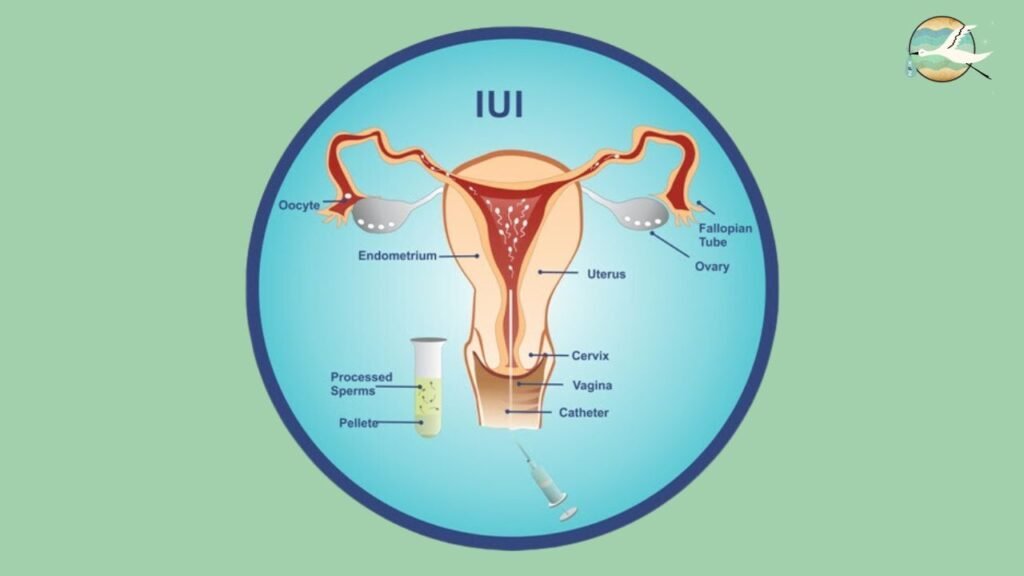Learn about who needs IUI treatment, its benefits, and the process. Discover if IUI could be the right fertility solution for you.
When it comes to fertility treatments, intrauterine insemination (IUI) has drawn a lot of attention as a successful strategy for couples having trouble getting pregnant. This article takes a deep dive into the world of IUI treatment, concentrating on who can use it and explaining the procedure. Continue reading if you want to learn more information that can help you decide whether IUI is the best route for you to go toward parenthood.
Table of Contents
Who Needs IUI Treatment?

For people or couples dealing with specific fertility challenges, intrauterine insemination, often known as IUI treatment, is frequently advised. Although each circumstance is different, IUI is frequently advised for:
Cervical Factor Infertility: Sperm can have trouble passing through the cervix and reaching the fallopian tubes in certain people because their cervical mucus is unfriendly to them. By injecting the sperm right into the uterus, IUI gets around this barrier.
Unexplained Infertility: IUI can be a good option when the cause of infertility is still unknown despite extensive testing. Boosting the quantity of sperm that enter the fallopian tubes, increases the likelihood of a successful conception.
Male Factor Infertility: IUI can increase the likelihood of conception in situations where the male partner has a low sperm count or sperm motility problems. To maximize the likelihood of a successful conception, the concentrated sperm sample used in IUI is specially prepared.
Ovulation Issues: IUI can be helpful for women who have unpredictable ovulation or have trouble determining their reproductive window. IUI increases the likelihood that the sperm and egg will come into contact by synchronizing the operation with ovulation induction drugs.
Same-Sex Couples or Single Parents: IUI offers hopeful steps toward parenting for same-sex couples and single people who want to get pregnant. The process can be customized to the needs of the person or couple and donor sperm can be used.
The IUI Process: Step by Step
Anyone looking for this reproductive treatment must have a thorough understanding of the IUI procedure. Here is a step-by-step description of what to anticipate:

1. Initial Consultation and Assessment
You will have a thorough consultation with a fertility doctor before beginning your IUI adventure. Depending on your medical history, results from testing, and assessments, you may be a good candidate for IUI.
2. Ovulation Monitoring
Ovulation is closely monitored with ultrasounds and blood tests before the operation. As a result, the IUI will ideally coincide with your fertile window.
3. Sperm Collection and Preparation
If you’re using sperm from a partner, the lab will gather and prepare it. To improve the viability of the sperm sample, washing and concentration are performed.
4. Insemination
The concentrated sperm sample is directly put into the uterus during the IUI technique using a narrow catheter. This increases the likelihood of fertilization by putting the sperm near the egg.
5. Waiting Period
There is only a brief waiting period following the treatment. Mild cramping or discomfort may be experienced by a few people, but the majority can carry on with their normal activities right away.
6. Pregnancy Test
A pregnancy test taken two weeks following the treatment will reveal whether the IUI was effective. Congratulations are in order if the test is positive; if not, your fertility specialist will advise you on what to do next.
How Successful Is IUI Treatment?
The underlying cause of infertility, the age of the woman, the quality of the sperm, and the overall health of the pair are some of the variables that can affect the outcome of IUI (Intrauterine Insemination) treatment. IUI success rates might range from 10% to 20% on average per cycle. However, based on unique conditions, these figures can vary greatly. The following are some important variables that can affect the success of IUI:
- Age: In general, younger women have better success rates with IUI than older women. Age-related fertility reduction affects the likelihood of a successful pregnancy.
- Cause of Infertility: When infertility is caused by modest problems, such as mild male factor infertility, unexplained infertility, or cervical mucus concerns, the success rate of IUI is higher. The success rates could be lower if there are more serious problems with egg quality, tubal blockages, or severe male factor infertility.
- Sperm Quality: The sperm used for IUI has a big impact on the outcome. Increased sperm motility, count, and morphology increase the likelihood of fertilization success.
- Ovulation Induction: Ovulation induction drugs are frequently used during IUI cycles to encourage the ovaries to generate more eggs. The success rates can vary depending on the quantity and caliber of eggs released.
- Number of Cycles: Multiple IUI cycles tend to boost success rates. A cumulative strategy can raise the overall likelihood of conception after numerous tries.
- Reproductive Health: Success can be impacted by things including the woman’s reproductive health, the existence of any uterine abnormalities, and the state of the fallopian tubes.
- Previous Pregnancy History: IUI success rates may be higher for couples who have already experienced successful pregnancies, whether naturally or through assisted reproductive methods.
It’s important to talk about the likelihood of IUI success with a fertility doctor who can offer individualized advice based on your particular circumstances. They can take into account all pertinent variables and assist you in making well-informed choices regarding the best fertility treatment strategy for your requirements.
What is the Cost of IUI Treatment?

IUI treatment in India normally costs between 5,000 and 20,000 rupees for one cycle. The cost may vary depending on the clinic’s location, the doctor’s training, and the availability of extra services. Medication and diagnostics may not be covered by this cost, which could result in additional costs. Some clinics provide discounted package deals for numerous cycles. It’s critical to first go over the cost breakdown with the clinic. IUI insurance coverage varies, so people should find out about any potential advantages. Planning for IUI treatment in India more successfully requires an understanding of the financial factors for both individuals and couples.
Related Information:
- Are Painful Periods a Sign of Good Fertility?
- How to Protect Fertility? Expert Tips for Long-term Reproductive Health 2023
- What are Sperm Cramps?
Is IUI Treatment Safe?
IUI treatment, commonly referred to as intrauterine insemination, is typically regarded as secure. Since it is not overly intrusive and only somewhat uncomfortable, this reproductive method has been used for many years. IUI entails fewer dangers and issues than more complicated procedures like IVF. It doesn’t call for anesthesia, which adds to its safety profile. Couples looking for help conceiving may find the procedure to be a good choice because of its low risk of infection and quick recovery.
FAQs about IUI Treatment
Q. Is IUI painful?
The process of IUI is very painless. The insemination may cause some people some minor discomfort, but most people tolerate it well.
Q. How many IUI cycles are recommended?
Depending on the circumstances of each person, a different number of IUI cycles may be advised. Couples typically go through three to six cycles before weighing choices.
Q. Are there any side effects?
IUI is a procedure with little risk, and severe adverse effects are uncommon. Minor cramping or spotting may occur in a few people, but it normally passes rapidly.
Q. What’s the success rate of IUI?
Success rates depend on several factors, including age, fertility issues, and overall health. On average, the success rate ranges from 10% to 20% per cycle.
Q. Can IUI be combined with other treatments?
Yes, IUI can be used in conjunction with fertility drugs to increase its effectiveness. Based on your particular circumstances, a fertility specialist will advise you on the best course of action.
Q. How do I choose between IUI and IVF?
The choice between IUI and IVF depends on several variables, including age, personal preferences, and the severity of fertility problems. You can make a wise choice by speaking with a fertility professional.
Conclusion
IUI is a type of fertility treatment that gives individuals and couples who are trying to get pregnant hope and possibilities. IUI might be the answer that moves you closer to parenting, regardless of whether you’re struggling with unexplained infertility, ovulation problems, or male factor issues. You can approach IUI treatment with optimism and confidence if you are aware of the procedure, success rates, and factors.
Remember that every journey is different, and speaking with an experienced fertility specialist will give you specialized advice catered to your particular needs. IUI can be the solution you’ve been looking for if you’re prepared to move forward on your journey toward parenting.





[…] “Intrauterine Insemination” (IUI) is what it’s called. When couples are having difficulties, it might be a method to support them. In IUI, sperm is directly injected into the uterus of the woman to assist the egg and sperm in fusing and creating a baby. In turn, this raises the possibility of becoming pregnant by facilitating the sperm’s discovery of the egg. Compared to certain other treatments, it is an easier and less expensive option. If a woman’s body has particular problems or if the man’s sperm isn’t very potent, people frequently try IUI when they are having trouble getting pregnant. […]
[…] Intrauterine insemination (IUI) and in vitro fertilization (IVF) stand out as two often utilized techniques to address fertility issues in the field of assisted reproductive technologies (ART). Both IUI and IVF have been shown to be successful in assisting couples and singles to conceive, but there are important differences in their procedures, results, and experiences. […]
[…] insemination (IUI): This entails injecting sperm right into the uterus around […]
[…] specialist can give people confronting reproductive issues specialized information and treatment […]